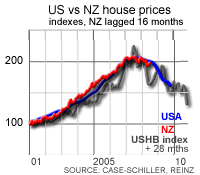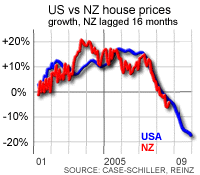 By Philip O'Connor This first graph shows the close relationship between NZ median home prices and those in the USA from 16 months before. Each country's house price index has been set to 100 in January 2000. USA house prices appear to have topped out in May 2006 at 206.9, which represents a 107% increase in price in 6½ years. The rise in NZ house prices was remarkably similar, but its peak occurred around 16 months later in November 2007 at 207.6. The 108% increase is almost exactly the same as the increase in USA house prices. If the close relationship continues, the Case-Schiller predicts a value for the NZ home price index of 161 in December 2009, or a NZ median house price of $273,700 (an 18% decline from current levels).
By Philip O'Connor This first graph shows the close relationship between NZ median home prices and those in the USA from 16 months before. Each country's house price index has been set to 100 in January 2000. USA house prices appear to have topped out in May 2006 at 206.9, which represents a 107% increase in price in 6½ years. The rise in NZ house prices was remarkably similar, but its peak occurred around 16 months later in November 2007 at 207.6. The 108% increase is almost exactly the same as the increase in USA house prices. If the close relationship continues, the Case-Schiller predicts a value for the NZ home price index of 161 in December 2009, or a NZ median house price of $273,700 (an 18% decline from current levels).  Although this is a simple analysis, and there is no need for the close correspondence to continue, the results are striking; this "lag analysis" suggests that NZ house prices will accelerate their price declines in the coming 16 months. The futures price for the November 2009 is predicting a price below 140 for the Case-Schiller 20 city composite, indicating that the decline in US house prices is expected to continue. Applying the lag relationship, it implies that in February 2011 NZ house prices could fall almost 30%. Also shown in the above graph is an index of the 10 largest USA Home Builders stock price. It was also set to a value of 100 in January 2000, and is much more volatile than the underlying house prices, rising to 1631 in June of 2005. It appears to precede the US house price index by about 12 months. The more volatile US Home Builders stock index predicts a value of 130 in February 2011, or a median NZ house price of $221,000. This represents an almost 35% decline from current levels, and is consistent with the futures price for the Case Schiller 20 city composite (below 140). Therefore, the lag relationship is predicting that in early 2011, NZ house prices will have declined in the order of 30% to 35% from current levels.
Although this is a simple analysis, and there is no need for the close correspondence to continue, the results are striking; this "lag analysis" suggests that NZ house prices will accelerate their price declines in the coming 16 months. The futures price for the November 2009 is predicting a price below 140 for the Case-Schiller 20 city composite, indicating that the decline in US house prices is expected to continue. Applying the lag relationship, it implies that in February 2011 NZ house prices could fall almost 30%. Also shown in the above graph is an index of the 10 largest USA Home Builders stock price. It was also set to a value of 100 in January 2000, and is much more volatile than the underlying house prices, rising to 1631 in June of 2005. It appears to precede the US house price index by about 12 months. The more volatile US Home Builders stock index predicts a value of 130 in February 2011, or a median NZ house price of $221,000. This represents an almost 35% decline from current levels, and is consistent with the futures price for the Case Schiller 20 city composite (below 140). Therefore, the lag relationship is predicting that in early 2011, NZ house prices will have declined in the order of 30% to 35% from current levels.
 The change in house prices is also remarkably consistent. This second graph shows the change in house prices over the past few years for NZ and the USA 16 months before. Again this is a simple analysis, and there is no need for the close correspondence to continue, but if it continues then NZ house prices in 16 months should be falling in value at an annual rate approaching 20%. Can NZ house prices continue to lag US house prices by 16 months? The number of factors that influence market prices are numerous and their interactions and effects are extremely difficult to gauge. Why the US housing market would influence the NZ housing market is likewise hard to ascertain and is really a matter of speculation. So putting aside the myriad fundamental factors that affect house prices and the relative differences between the two countries, is it possible to observe such a predictable market price? The key reason why it may be possible for NZ prices to lag US prices is that it is impossible to short houses. Even if you knew that prices were to fall in this manner, how can you borrow houses and sell them to buy back later at a lower price? I do not know of a way to do this. Therefore, it is possible that prices in the less liquid and non-shortable housing market can lag in predictable ways. If the US housing market is 12 months behind the stock price of US homebuilders, and the NZ housing market is 16 months behind the US housing market, the item of interest to watch is the US homebuilders stock price, a good proxy being the exchange-traded fund, XHB (http://finance.yahoo.com/q?s=XHB). Until the XHB makes a bottom (stops going down in value), it is possible that NZ housing prices will continue to fall for the next 28 months. * Philip O'Connor is a Senior Lecturer in finance at the University of Auckland's Department of Accounting and Finance.
The change in house prices is also remarkably consistent. This second graph shows the change in house prices over the past few years for NZ and the USA 16 months before. Again this is a simple analysis, and there is no need for the close correspondence to continue, but if it continues then NZ house prices in 16 months should be falling in value at an annual rate approaching 20%. Can NZ house prices continue to lag US house prices by 16 months? The number of factors that influence market prices are numerous and their interactions and effects are extremely difficult to gauge. Why the US housing market would influence the NZ housing market is likewise hard to ascertain and is really a matter of speculation. So putting aside the myriad fundamental factors that affect house prices and the relative differences between the two countries, is it possible to observe such a predictable market price? The key reason why it may be possible for NZ prices to lag US prices is that it is impossible to short houses. Even if you knew that prices were to fall in this manner, how can you borrow houses and sell them to buy back later at a lower price? I do not know of a way to do this. Therefore, it is possible that prices in the less liquid and non-shortable housing market can lag in predictable ways. If the US housing market is 12 months behind the stock price of US homebuilders, and the NZ housing market is 16 months behind the US housing market, the item of interest to watch is the US homebuilders stock price, a good proxy being the exchange-traded fund, XHB (http://finance.yahoo.com/q?s=XHB). Until the XHB makes a bottom (stops going down in value), it is possible that NZ housing prices will continue to fall for the next 28 months. * Philip O'Connor is a Senior Lecturer in finance at the University of Auckland's Department of Accounting and Finance.
We welcome your comments below. If you are not already registered, please register to comment
Remember we welcome robust, respectful and insightful debate. We don't welcome abusive or defamatory comments and will de-register those repeatedly making such comments. Our current comment policy is here.